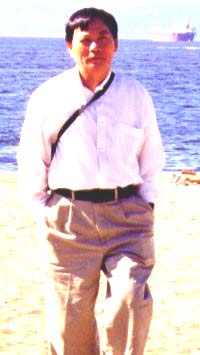 2 |
For a lousy battery
Early
in the summer of 1949, four years after An American who must have been a language officer praised my essay; and I was awarded two ponderous, Army- issue batteries. After
the war, our teachers had persisted in asking us why
we thought These were the same teachers whose question, until recently, had been “What would we do if His Majesty the Emperor commanded us to die?" The correct answer to that one: we would die—we would commit hara-kiri and die. I
resented this unvarying litany, and when we were asked,
for the essay contest, to write on the topic "How is science useful to
us?" I rebelled. "Science will enable us to win the next war," I
argued. I was summoned to the teachers' room. The compositions by the
students
who had been asked to compete at my school, in the The hulking batteries I had won were duly installed in the school’s science room, where they sat untouched. Until the blackout. On
August 16th, the day after the anniversary of the defeat,
a Japanese athlete performed well in a swimming championship held in The races on the second day of the meet were also broadcast, but it had been raining heavily since the night before and the power in our valley went out. The principal asked the science teacher if he could put those military batteries to work. With the entire school looking on, he hooked them up, and the radio exploded. But this mishap was an inspiration to one of my friends, who was a science whiz. Assembling his buddies in the science room, he hooked the batteries up to every gauge and gadget he could find, filling the room with unfamiliar fireworks of sound and light. He pursued his research late into the night, and finally managed to set the room on fire. Reprimanded by the principal, my friend ran away from home and drowned in the swollen waters of the river that runs through our valley. When representatives of the school appeared at his funeral, his mother confronted them. "For a lousy battery!" she cried. Had her child deserved to die for some mischief with a battery? Her bitterness cut through me. It was I, after all, who had brought the batteries to our village. My friend's mother seemed to have lost her mind. For a time, she would stand at the village intersection and loudly declare her intention to dig up the hunting guns that the men had hidden in the forest after the war and turn them on the school and the police station. One day she failed to appear, and we never saw her again. If
this incident revealed anything, it was the odd
intransigence of our own culture in its encounter with another ( Translated, from the Japanese, by John Nathan. |